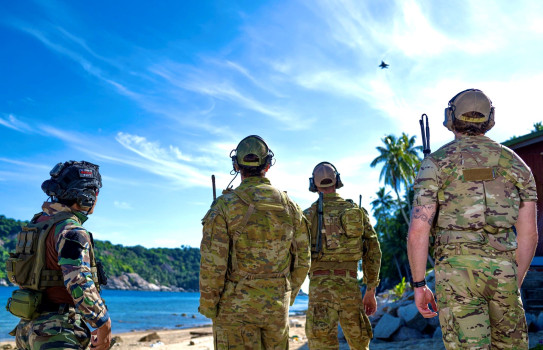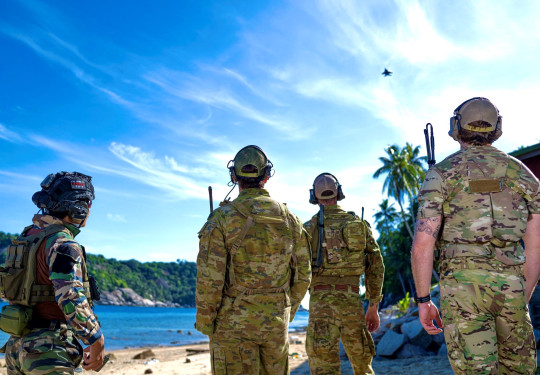Exercising with the Five Powers
The annual Exercise Bersama Shield provides invaluable experience in the complexity of South East Asia battle-spaces.
07 June, 2024
From 18 April to 10 May, ten New Zealand Defence Force personnel took part in Exercise Bersama Shield, one of a series of annual Five Power Defence Arrangements exercises involving Australia, Malaysia, New Zealand, Singapore and the United Kingdom. Signed in 1971, it is South East Asia’s only collective security agreement.
Hosted in either Malaysia or Singapore, the exercise enhances interoperability and strengthens the relationships of FPDA nations through the conduct of combined joint maritime, land and air operations. The premise is a multi-threat environment off the coast of Malaysia.
This year’s exercise involved 16 fighter aircraft, 10 support aircraft, 1 helicopter, 3 ships and 140 personnel from all five nations, based mainly in Malaysia.
The New Zealand personnel, in the Combined Joint Headquarters in Butterworth, Penang, fulfilled a number of roles including air planning and safety, scenario development, communications support, watchkeeping and logistics functions.
WGCDR Graham, the Senior National Officer for the New Zealand contingent, says the key aspect for New Zealand is experiencing the complex and challenging operating environment of South East Asia.
“If we go to Exercises in Hawaii or Australia, the crews are working in a deep water blue ocean environment, generally great weather, and relatively low shipping traffic. Around New Zealand there are mostly just fishing vessels and small numbers of merchant ships.
“But South East Asia is a complex environment with extremely busy airspace and battlespace. You have high-density shipping lanes, both commercial and military, and oil fields. 90,000 ships go through the Straits of Malacca every year. It’s the key arterial sea line of communication between the Indian Ocean and the Pacific Ocean, through which 60% of the world’s trade flows, and so it has direct relevance for New Zealand’s security.’
“There are environmental challenges, such as extreme bad weather, heat and humidity. There’s geo-political complexities and cultural sensitivities.”
“And it’s a unique electromagnetic environment, all these radars and emissions, lots of complex signals for operators to make sense of using their onboard sensors.”

Joint Terminal Attack Controllers from Australia, UK and Malaysia watch a Republic of Singapore Air Force F-15 conduct a simulated Close Air Support mission in Malaysia during Exercise Bersama Shield.
Technologically the host countries have a different approach to integration that is less reliant on advanced information systems and more reliant on process, he says.
“Simplicity and brevity replace complexity and so you have to re-think how you communicate and integrate. With voice communication, you’re dealing with people with accented English.
“These are going to be the characteristics of exercises in the South China Sea and the Indian Ocean. It’s an operating environment you can’t easily replicate with a simulator.”
Bersama Shield 2024 is the first in a series of exercises for the FPDA, which includes Exercise Suman Warrior, a tactical-level Command Post Exercise hosted in the United Kingdom in November, and Exercise Bersama Lima in October, hosted by Singapore.
The NZDF will be deploying a Poseidon P-8 aircraft to Bersama Lima, he says.
FPDA exercises are a useful way to expose air force, navy and army officers to military planning, tasking and execution duties in a Combined Joint Operations Centre alongside key partners.
“For air and naval crews getting the chance to operate in South East Asia airspace and seaspace, is great training. Leading or working alongside FPDA Naval Task Forces, supported overhead by P-8As, provide an excellent development opportunity for Navy commanders, working in company and practising protection of commercial shipping and self-defence against a number of air, surface and sub-surface threats they may realistically face if hostilities erupt.”
Everyone came back from Bersama Shield buzzing, he says. “It’s an awesome experience. We’ve been going for years and you get great friendships out of it. It’s ideal for people who haven’t been exposed to this before, and doing something you can’t experience in New Zealand. It’s extremely rewarding.”
